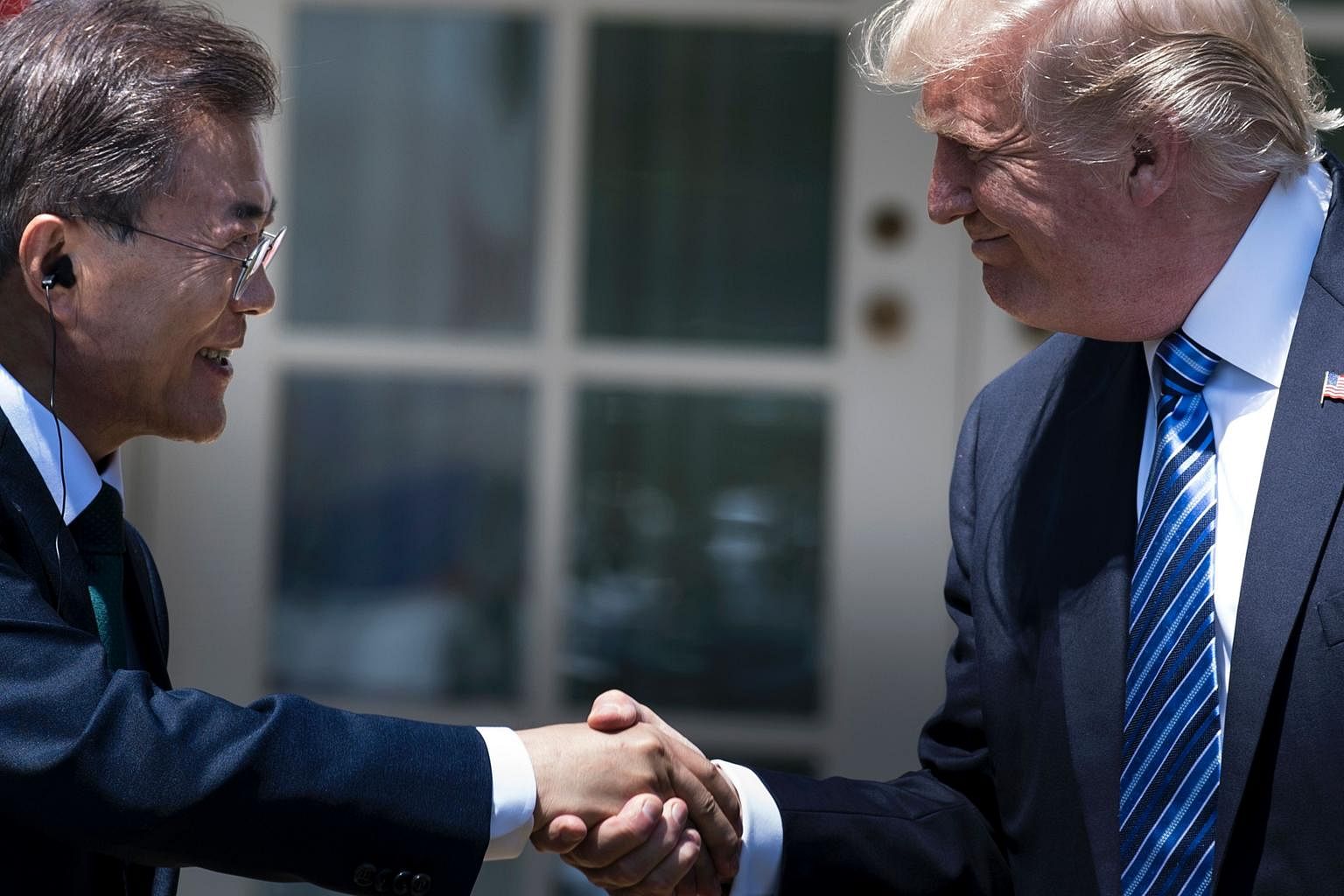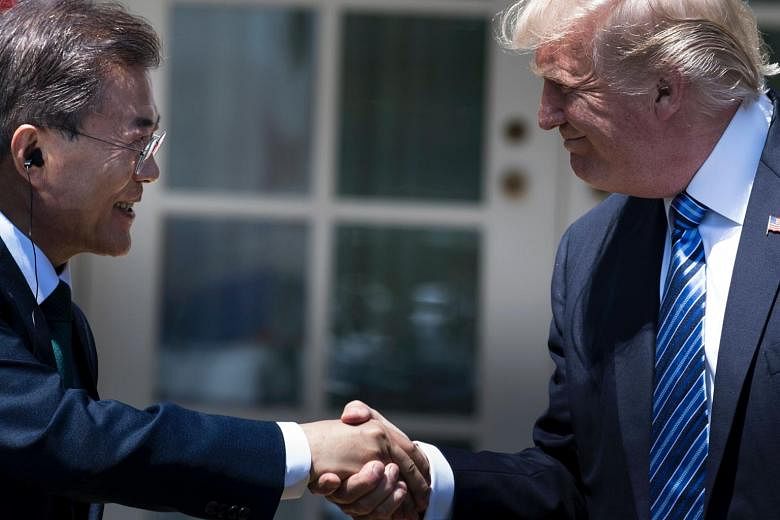The first meeting between South Korean President Moon Jae In and his US counterpart Donald Trump was, by most accounts, a successful one, with both leaders embarking on a full-on charm offensive to build trust and reaffirm the Seoul-Washington alliance.
Fears of possible friction were dispelled by wide smiles and firm handshakes between the two men, who met at the White House last week. While there were no major breakthroughs, they did agree on various issues, including security, trade and future partnerships.
Most notably, they put up a united front on how to deal with the North Korea issue, agreeing to seek a "phased, comprehensive approach" using both sanctions and dialogue to end the belligerent North's nuclear programme.
They also reaffirmed the United States-South Korea alliance, with Mr Moon saying at a press conference on Friday that they were "walking the same path towards a great alliance" - to which Mr Trump added: "Our personal relationship with President Moon... is very, very good."
Analysts said the liberal-minded Mr Moon, elected in May after 10 years of conservative rule, managed to send a clear message that he is not a replica of the last liberal president Roh Moo Hyun, who pursued a North-friendly "Sunshine Policy" at the expense of US ties. Mr Moon, born to North Korean parents who fled to the South during the Korean War, was a key aide to Mr Roh during the latter's 2003-2008 term.

Dr Bong Young Shik of Yonsei University's Institute for North Korean Studies said: "Dispelling the image of (himself as) a leader who is dangerously close to and sympathetic to North Korea was a huge achievement for (Mr Moon).
-
Key issues at Moon-Trump summit
-
NORTH KOREA
South Korea President Moon Jae In and US President Donald Trump put up an united front against the missile and nuclear threat posed by North Korea .
Mr Moon said both sides are open to renewed dialogue with the North but only under circumstances that would lead to it giving up its weapons programmes.
DEFENCE ARRANGEMENT
Both sides agreed to work to enable the transfer of wartime operational control of South Korean forces to Seoul, a move agreed more than a decade earlier.
TRADE
Mr Trump said South Korea must give US automakers "a fair shake" to sell more cars there and stop exporting "dumped steel". Both sides are renegotiating their free trade deal as the US tries to lower its trade deficit with the South.
South Korean firms have announced a plan to jointly invest US$12.8 billion (S$17.5 billion) in the US over the next five years. Seoul also said it will soon begin importing shale gas from the US.
SOURCES: REUTERS, BLOOMBERG
"His emphasis on consolidating the US-Korea security partnership is a very important message that alleviates the anxiety that is pervasive among the conservatives in South Korea and in the US."
Mr Moon said during his media address that he and Mr Trump had agreed to work closely to strengthen their joint defence against Pyongyang threats. "North Korea should not underestimate our firm resolve," he said.
The assurances from South Korea's security guarantor, say analysts, give Mr Moon the mandate to seek dialogue with the North, but not without conditions.
Mr Moon had said earlier that talks can be restarted if Pyongyang freezes its nuclear programme.
North Korea has ramped up missile testing in the past year, making advances in its bid to develop a missile capable of striking the US mainland.
In another sign of both leaders' desire to ensure a smooth summit, the thorny issue of the deployment of the Terminal High Altitude Area Defence (Thaad) missile shield drew no mention from either side.
"If you bring Thaad out, they cannot reach an amicable atmosphere," said political commentator David Lee, adding that Seoul has stated it will not reverse its decision on Thaad.
The two launchers already deployed will stay, but further deployment has been halted by Mr Moon pending an environmental impact assessment on the site. This is expected to take up to one year. Analysts say this will buy Mr Moon some time to appease China, which opposes Thaad.
During the two-day summit, the business team that accompanied Mr Moon pledged US$12.8 billion (S$17.6 billion) worth of investments in the US economy.
Mr Trump was clearly pleased. It was reassuring, he said, to get Mr Moon's commitment to level the playing field for US firms venturing into South Korea.
Dr Go Myong Hyun of the Asan Institute for Policy Studies warned that it remains to be seen how the talks over a new free trade deal will pan out. He said Mr Moon "did not make any firm assurance" in his public comments. "In terms of security issues, the US and South Korea have closed the gap on their approach to North Korea. But on trade, there is still... discrepancy between the two sides."


